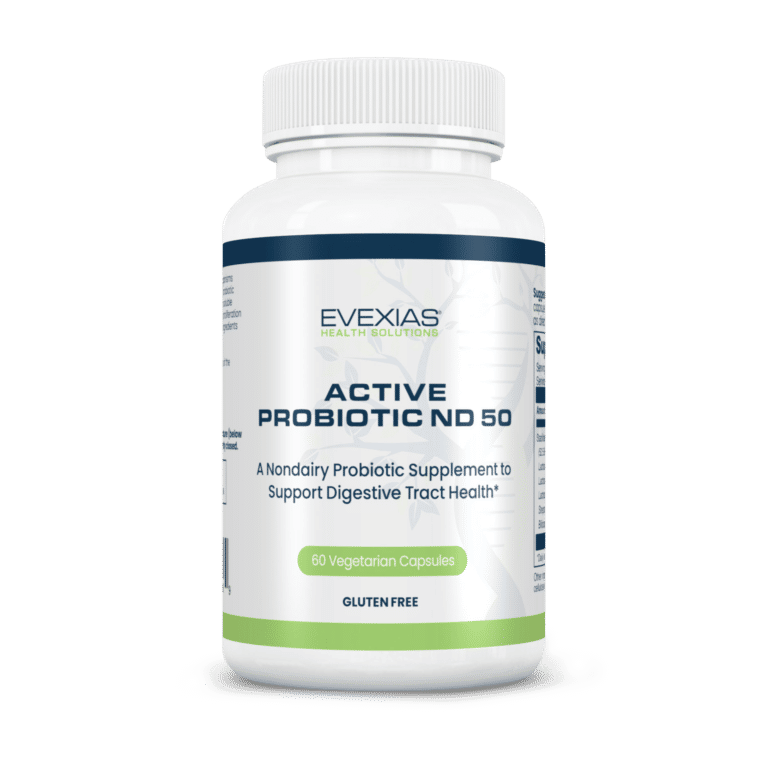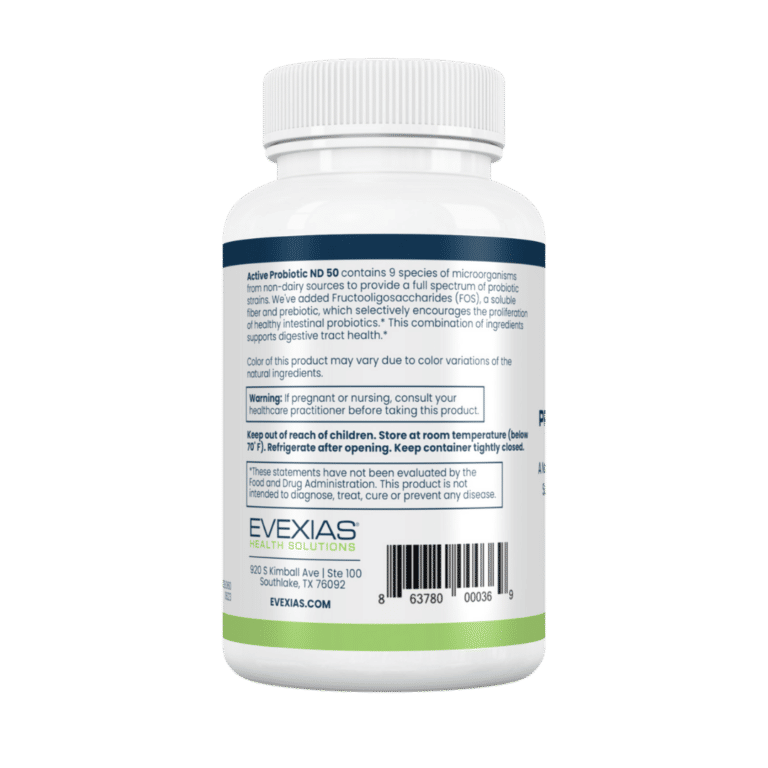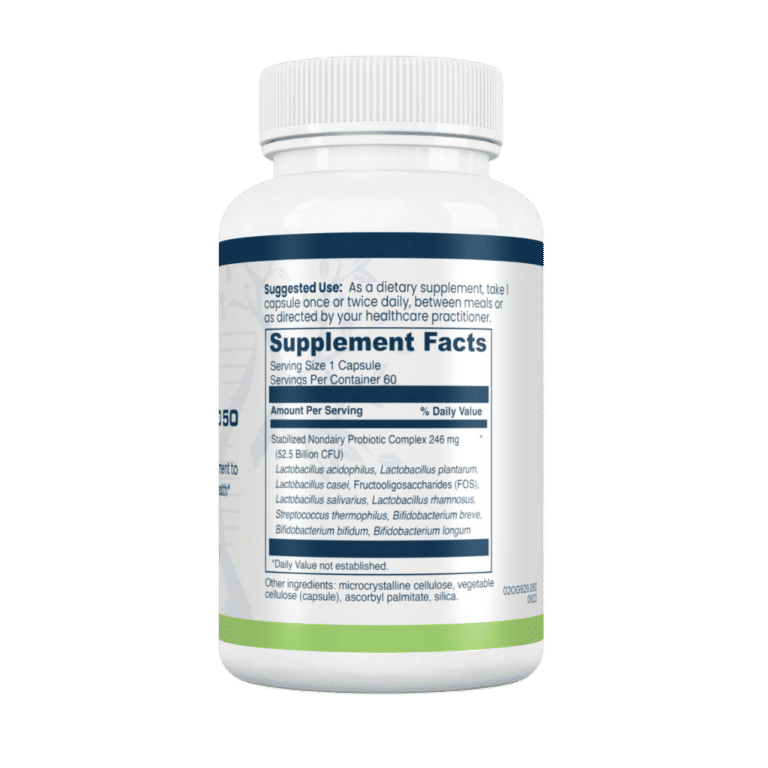Active Probiotic ND 50
Active Probiotic ND 50 by EVEXIAS Health Solutions Nutraceuticals is an elite, high-potency probiotic supplement meticulously formulated to support your core wellness without the need for refrigeration. Each non-dairy capsule delivers a powerful 52.5 billion CFUs, featuring a strategic alliance of 10 robust probiotic strains and the prebiotic Fructooligosaccharides (FOS). This synergistic, shelf-stable formula is engineered to optimize the health of your gut microbiome, enhance digestive processes, and fortify your immune function. It provides a comprehensive approach to microbiome restoration, making it an ideal choice for individuals across navigating digestive disorders, immune system imbalances, or lactose intolerance.
Table of Contents
What It Is
Active Probiotic ND 50 is a professional-grade, symbiotic formula that combines probiotics and prebiotics to effectively repopulate the gastrointestinal tract with beneficial bacteria and enhance microbiome diversity. Its advanced non-dairy and heat-stable composition ensures that the full potency of the probiotics is delivered effectively, guaranteeing quality and making it a versatile option for a wide range of patients, especially those with dietary sensitivities.
What It Does
- Replenishes beneficial gut flora to promote a healthy, balanced microbiome
- Supports digestive regularity, enhances the absorption of essential nutrients, and maintains bowel integrity
- Bolsters the body's immune response and promotes urinary tract health
- Aids in reducing systemic inflammation and addresses blood sugar imbalances
- Assists in the management of various gastrointestinal and mood-related conditions
- Provides essential daily support for maintaining healthy gut-brain axis communication
Who It's For
Active Probiotic ND 50 is an ideal daily supplement for:
- Individuals managing digestive conditions such as IBS, IBD, Crohn’s, Colitis, GERD, or general gut distress
- Those suffering from common digestive complaints like constipation, diarrhea, bloating, or irregularity
- Patients navigating anxiety, depression, or mood instability that may be linked to gut health
- Anyone seeking to strengthen their immune system and improve urinary health
- Individuals dealing with arthritis or other systemic inflammation issues
- Anyone looking for a high-potency, non-dairy probiotic for preventative wellness and daily health maintenance
Active Ingredients
Serving Size: 1 capsule
- Total CFUs: 52.5 Billion
- Probiotic Strains: A robust blend including Lactobacillus acidophilus (UALa-01™),
- Lactobacillus plantarum (UALp-05™),
- Lactobacillus casei (UALc-03™),
- Lactobacillus salivarius (UALs-07™)
- Lactobacillus rhamnosus (UALrh-18™)
- Streptococcus thermophilus (UASt-09™)
- Bifidobacterium breve (UABb-11™)
- Bifidobacterium bifidum (UABb-10™),
- Bifidobacterium longum (UABl-14™).
- Prebiotic: Fructooligosaccharides (FOS).
Mechanism of Action
This formula operates by introducing a high volume of live, viable probiotic organisms directly into the gastrointestinal tract. There, they colonize the gut lining, effectively crowding out harmful bacteria and restoring a healthy microbial balance. The inclusion of FOS, a powerful prebiotic fiber, acts as a food source for these beneficial bacteria, stimulating their growth and ensuring their sustained activity over time. This symbiotic relationship reinforces gut integrity and optimizes systemic communication through the vital gut-brain and gut-immune axes. The non-dairy, shelf-stable nature of the formula guarantees consistent potency without refrigeration, making it perfect for travel throughout and daily convenience.
Key Health Benefits for Those
- Fosters Gut Microbiome Balance & Diversity
- Improves Digestive Regularity & Nutrient Absorption
- Strengthens Immune Function & Urinary Tract Health, ideal for those
- Reduces Systemic Inflammation & May Help Lower Blood Sugar
- Supports Mood, Cognitive Function, and the Gut-Brain Axis
- Alleviates GI Discomfort Associated with IBS, IBD, Crohn’s & GERD
- Completely Safe for Lactose Intolerant Individuals across
Conditions Supported
- IBS (Irritable Bowel Syndrome)
- IBD (Irritable Bowel Disease)
- Crohn’s Disease & Ulcerative Colitis
- Constipation, Diarrhea & Bloating
- GERD (Gastroesophageal Reflux Disease)
- Anxiety, Depression & Mood Disorders
- Arthritis & Inflammatory Syndromes
- Gut Dysbiosis, Leaky Gut & General Gut Health
Why Choose EVEXIAS Health Solutions Nutraceuticals?
EVEXIAS Health Solutions provides physician-developed nutraceuticals that thoughtfully merge clinical efficacy with a natural approach to wellness. Active Probiotic ND 50 embodies this commitment, delivering high-impact microbiome support that is backed by science and designed for real-world application. Whether you are addressing a chronic health condition or striving to maintain optimal daily wellness, this formula provides the essential gut-first foundation your body needs to thrive in the modern world.




















